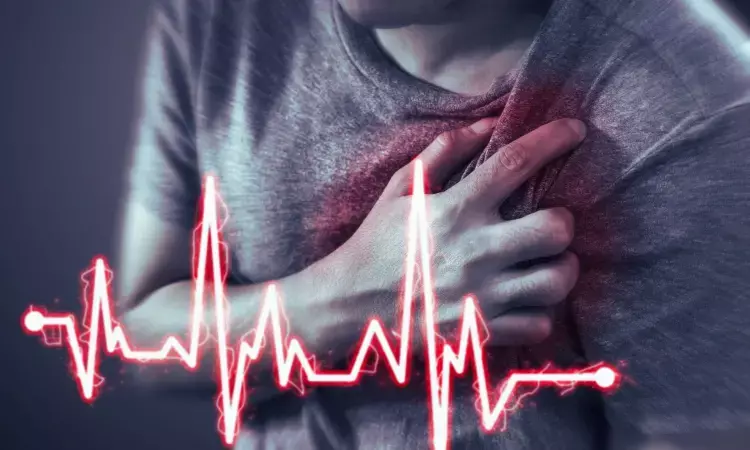- Home
- Medical news & Guidelines
- Anesthesiology
- Cardiology and CTVS
- Critical Care
- Dentistry
- Dermatology
- Diabetes and Endocrinology
- ENT
- Gastroenterology
- Medicine
- Nephrology
- Neurology
- Obstretics-Gynaecology
- Oncology
- Ophthalmology
- Orthopaedics
- Pediatrics-Neonatology
- Psychiatry
- Pulmonology
- Radiology
- Surgery
- Urology
- Laboratory Medicine
- Diet
- Nursing
- Paramedical
- Physiotherapy
- Health news
- Fact Check
- Bone Health Fact Check
- Brain Health Fact Check
- Cancer Related Fact Check
- Child Care Fact Check
- Dental and oral health fact check
- Diabetes and metabolic health fact check
- Diet and Nutrition Fact Check
- Eye and ENT Care Fact Check
- Fitness fact check
- Gut health fact check
- Heart health fact check
- Kidney health fact check
- Medical education fact check
- Men's health fact check
- Respiratory fact check
- Skin and hair care fact check
- Vaccine and Immunization fact check
- Women's health fact check
- AYUSH
- State News
- Andaman and Nicobar Islands
- Andhra Pradesh
- Arunachal Pradesh
- Assam
- Bihar
- Chandigarh
- Chattisgarh
- Dadra and Nagar Haveli
- Daman and Diu
- Delhi
- Goa
- Gujarat
- Haryana
- Himachal Pradesh
- Jammu & Kashmir
- Jharkhand
- Karnataka
- Kerala
- Ladakh
- Lakshadweep
- Madhya Pradesh
- Maharashtra
- Manipur
- Meghalaya
- Mizoram
- Nagaland
- Odisha
- Puducherry
- Punjab
- Rajasthan
- Sikkim
- Tamil Nadu
- Telangana
- Tripura
- Uttar Pradesh
- Uttrakhand
- West Bengal
- Medical Education
- Industry
Implications of cumulative epinephrine dosage on mortality outcomes after non-shockable out-of-hospital cardiac arrest

Recently published study aimed to assess the association between epinephrine use during cardiopulmonary resuscitation (CPR) and subsequent intensive care unit (ICU) mortality in patients with return of spontaneous circulation (ROSC) after non-shockable out-of-hospital cardiac arrest (OHCA). The study analyzed data from the Sudden Death Expertise Center (SDEC) registry, which included adults with ROSC after non-shockable OHCA admitted to an ICU in the Greater Paris area, France between May 2011 and December 2021. Of the 2,792 patients analyzed, the study found that the cumulative dose of epinephrine used during CPR was strongly associated with cardiocirculatory death. The proportion of cardiocirculatory death increased linearly with cumulative epinephrine doses, with a significant association between high cumulative doses of epinephrine and cardiocirculatory death, even after adjusting for various factors. Additionally, the study suggested that the management after ROSC in the ICU should be adapted to the dose of epinephrine received during CPR, and strategies for preventing and managing post-resuscitation shock and sudden death recurrence should be evaluated in future randomized trials based on the cumulative dose of epinephrine. The study also highlighted the need for future studies aiming to limit the dose of epinephrine during CPR and suggested that therapeutic targets in the post-ROSC management should be adapted to each patient based on the epinephrine dose used during CPR. The findings support the importance of considering the cumulative dose of epinephrine in personalizing post-ROSC management, as it was found to be strongly associated with early cardiocirculatory death in non-shockable OHCA. The study emphasized the potential implications for optimizing therapeutics and personalizing management in the ICU.
Reference –
Javaudin, F., Bougouin, W., Fanet, L. et al. Cumulative dose of epinephrine and mode of death after non-shockable out-of-hospital cardiac arrest: a registry-based study. Crit Care 27, 496 (2023). https://doi.org/10.1186/s13054-023-04776-0.
MBBS, MD (Anaesthesiology), FNB (Cardiac Anaesthesiology)
Dr Monish Raut is a practicing Cardiac Anesthesiologist. He completed his MBBS at Government Medical College, Nagpur, and pursued his MD in Anesthesiology at BJ Medical College, Pune. Further specializing in Cardiac Anesthesiology, Dr Raut earned his FNB in Cardiac Anesthesiology from Sir Ganga Ram Hospital, Delhi.
Dr Kamal Kant Kohli-MBBS, DTCD- a chest specialist with more than 30 years of practice and a flair for writing clinical articles, Dr Kamal Kant Kohli joined Medical Dialogues as a Chief Editor of Medical News. Besides writing articles, as an editor, he proofreads and verifies all the medical content published on Medical Dialogues including those coming from journals, studies,medical conferences,guidelines etc. Email: drkohli@medicaldialogues.in. Contact no. 011-43720751


